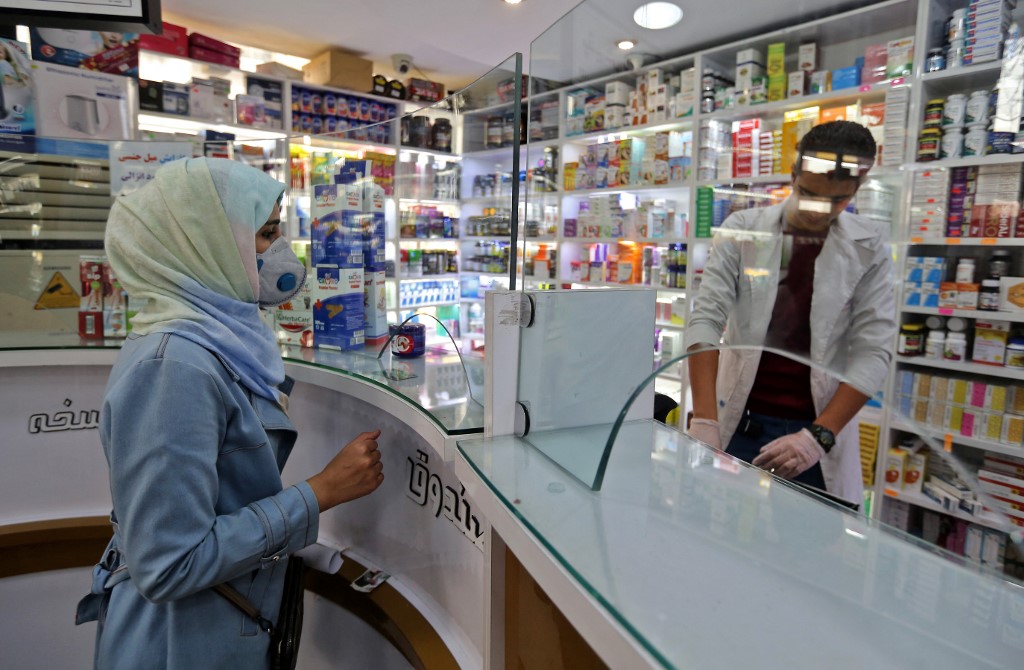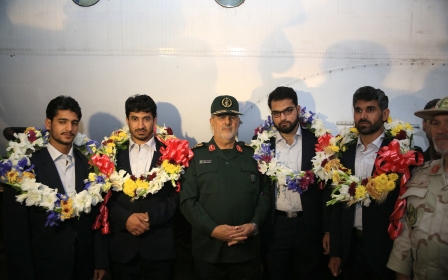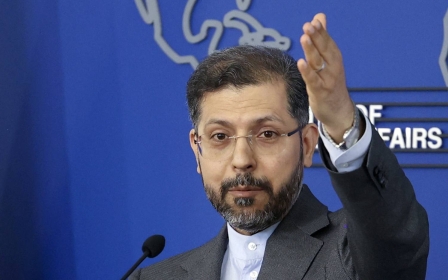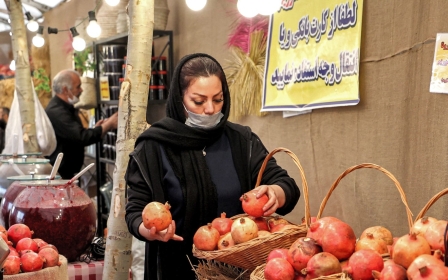Iran: How corruption has created a severe medicine shortage
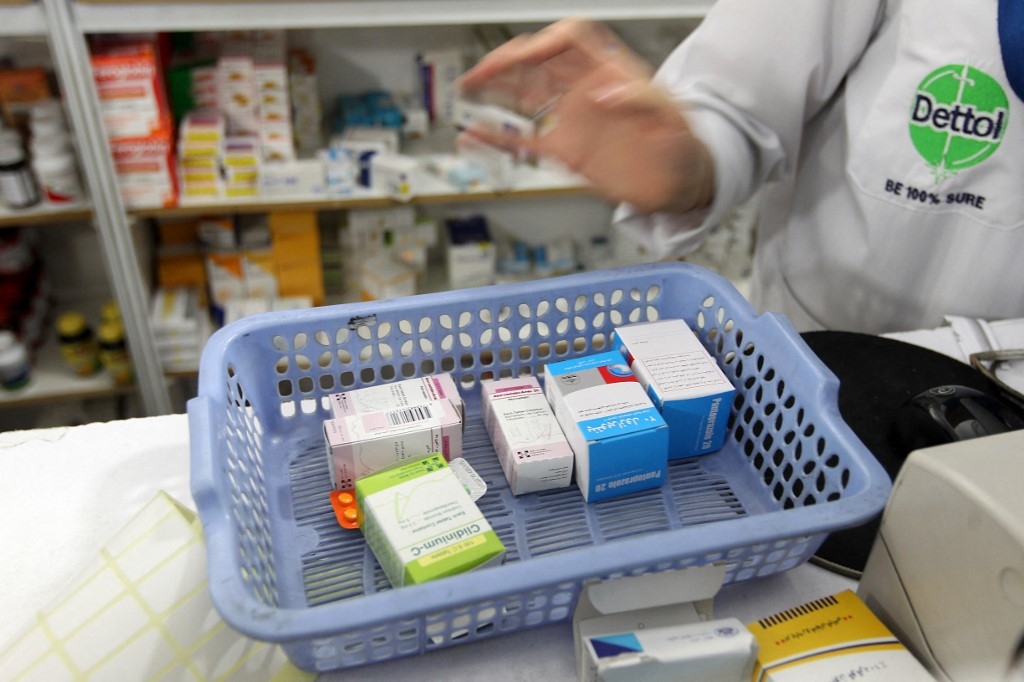
Motorcycle riders line up in front of a crowded, state-run pharmacy on Tehran's Karim Khan street, where hard-to-find medicines are sold. They ask anyone coming out of the pharmacy "Motor? Motor?", offering a ride to a few other pharmacies with the same role in the Iranian capital. In Tehran's infuriating traffic, motorcycles are the fastest means of transport.
"I used to give rides to people in the Grand Bazaar," says one of the motorcyclists. "After the Nowruz [Iranian new year] holiday, a colleague told me this pharmacy is crowded, and many need a ride from here, so now it's about 10 days I've been working here."
'Finding some medicines in Tehran is harder than buying heroin or opium'
- Morteza Ameri, Tehran resident
Inside, the pharmacy is packed with people. Those who could not find medications in private drugstores or hospitals take a number from a ticket dispenser and wait in line for their turn to check the availability of their prescription.
Behind the counters, pharmacists in dirty white coats look very busy. When they say "We don't have it" to a client, they take back their prescriptions, head out and run to a motorcyclist in order to go as fast as possible to another pharmacy.
As people search for medicines on the streets, President Ebrahim Raisi's administration continues to reject any reports about the medicine shortages or a rise in the price of drugs.
New MEE newsletter: Jerusalem Dispatch
Sign up to get the latest insights and analysis on Israel-Palestine, alongside Turkey Unpacked and other MEE newsletters
"Surely this year we won't have a medicine shortage, and we won't let the slightest problem occur," Health Minister Bahram Einollahi told local media on 10 April.
Despite the officials' assurance, several Tehran residents who spoke to Middle East Eye confirmed that they could not find the medicines they needed.
'It was crazy'
"Finding some medicines in Tehran is harder than buying heroin or opium," Morteza Ameri told MEE. In February, Ameri's father underwent surgery to have a tumour removed from his brain. After being discharged from hospital, he immediately needed anticonvulsant sodium valproate pills.
"The doctor told us to buy a foreign brand because the Iranian one was not as efficient. But we could not find it in any pharmacy," Ameri said.
"Finally, a technician in a pharmacy kept me waiting until I was the only customer, and he told me: 'I might be able to get you one pack of 30 tablets, but not now; you have to come back in two or three hours.'"
Aiming to kill that time, he went to a small park on the Resalt highway - which had its name officially changed to Qassem Soleimani after the US assassinated the Islamic Revolutionary Guard Corps commander in Iraq in 2020.
Sitting on a bench, waiting, playing on his phone and calling his mum to give her the good news about finding the pills, Ameri noticed how freely drug dealers were selling to their customers.
"It was crazy. Everything was going on very openly and freely," he said. "The drug consumers went to the dealer; the dealer disappeared behind the boxwood shrubs and returned with something in his hand. He received the money, and the consumers were gone in the blink of an eye. But I had to wait for three hours to buy something legal."
When Ameri returned to the pharmacy, the chemist gave him two 30-pill packets of sodium, and he left the drugstore, surprised and delighted to have two packs instead of one.
Transplant patients
The situation is even more dreadful for Iranians suffering from rare diseases, cancer, thalassemia, depression, haemophilia, multiple sclerosis and those with kidney and liver transplants.
Mojtaba Farahani had a kidney transplant two years ago and ever since has had to take Myfortic (mycophenolic acid) pills to prevent organ rejection. But the original brand is not always available in the country.
"Sometimes you can find it, and other times it's not available even on the black market," Farahani said. When patients like Farahani cannot find the original Myfortic, they have no choice but to buy the Iranian one, which can cause immune system issues.
"My doctor said he would not accept any responsibility for my health if I consume the Iranian medication," Farahani said. "Doctors know that the Iranian version of some medicines generates irreversible health problems for their patients because of low quality and lack of standards. Therefore, doctors strongly advise us to avoid consuming domestic products."
Corruption and nepotism
The medicine shortage is not a new issue for Iranians, who have been hit by various sanctions over the past four decades. However, the experts who MEE spoke to underlined that, due to the unprecedented levels of corruption and nepotism, Iran's current drugs shortage is the worst in 15 years.
The current crisis started in 2018, when the US pulled out of the 2015 nuclear deal and began imposing over 1,000 new sanctions on Iran's economy. As a result, Tehran could no longer sell its oil and petrochemical products, and its currency went into a nosedive, losing over 70 percent of its value.
The solution found by former president Hassan Rouhani's administration was to sell foreign currency at subsidised exchange rates to importers of essential goods and medicines. So, when $1 was trading at about 280,000 Iranian rials on the open market, medicine importers could buy dollars from the government for 42,000 rials.
"On paper, that was a perfect plan to import essential medicines to the country. But in reality, it only filled the pockets of those well-connected to the establishment," said a manager at a pharmaceutical company trading for over 50 years.
"On different occasions, we applied to receive the subsidised foreign currency, and the government never accepted our requests. Our company has been on the verge of bankruptcy during the past four years. But at the same time, a handful of new pharmaceutical companies were established whose directors were relatives or associates of people in power. Those firms made millions of dollars."
Black market
A pharmacist who worked in drugstores and pharmaceutical firms for 15 years said that the monitoring organisations do not control the economic activities of companies and pharmacies connected to the establishment. So they have several failsafe ways to make a huge profit out of each batch of medicines they import.
"The easiest way for them is not to use all the foreign currency they receive from the government for the imports," he said. "With no hassle, the Nur-e Cheshmi importers can sell some of those dollars on the open market and earn a lot," he added, using a phrase in Farsi that means "the light for the eye" and is used to address well-connected people.
'A handful of new pharmaceutical companies were established, whose directors were associates of people in power. Those firms made millions of dollars'
- Medicine company manager
The pharmacist told MEE that the importers connected to the establishment deploy two other techniques to make millions of dollars in Iran's troubled economy: the black market and medicines trafficking.
Last week, the head of Iran's Food and Drug Administration, Bahram Daraei, revealed that the tuberculosis pill Rifampin was "easily trafficked to Afghanistan in trucks and containers," causing shortages in Iran.
The pharmacist, however, believed that many other medications are also trafficked to Iran's neighbouring countries.
"The importers can keep parts of the imported batches for the black market or traffic it to Iraq, Afghanistan and Turkmenistan. That's very easy to do, and this will continue until we have an independent and accountable monitoring system," he said.
He also agreed with the officials at the health ministry who said that the government would not have any problems supplying the medicines needed by Iranians.
"They are right that the government has no problem importing and producing all the medications we need," he said. "Their problem is the corruption and nepotism that results in the distribution of the medications on the black market or trafficking it to other countries."
Middle East Eye delivers independent and unrivalled coverage and analysis of the Middle East, North Africa and beyond. To learn more about republishing this content and the associated fees, please fill out this form. More about MEE can be found here.



